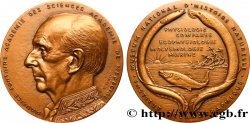fme_631012 - SCIENCES & SCIENTIFIQUES Médaille, J. Robert Oppenheimer
Nicht verfügbar.
Artikel auf unserem Online-Shop verkauft (2021)
Preis : 100.00 €
Artikel auf unserem Online-Shop verkauft (2021)
Preis : 100.00 €
Type : Médaille, J. Robert Oppenheimer
Datum: 1967
Name der Münzstätte / Stadt : Monnaie de Paris
Prägemenge : 150
Metall : Kupfer
Durchmesser : 79,5 mm
Stempelstellung : 12 h.
Gewicht : 313,49 g.
Rand lisse + corne CUIVRE + 1967 + N°12/150
Punze : corne CUIVRE
Kommentare zum Erhaltungszustand:
Patine hétérogène avec de petites concrétions au revers. Exemplaire placé dans une boîte cartonnée bleue
Vorderseite
Titulatur der Vorderseite .ROBERT... - .OPPENHEIMER..
Beschreibung Vorderseite Buste de face.
Rückseite
Titulatur der Rückseite CARITAS / (FORMULE PHYSIQUE).
Beschreibung Rückseite Formule physique sur fond de courbes et lignes droites.
Kommentare
IL s’agit du 12e exemplaire sur une édition de 150 médailles
J. Robert Oppenheimer (1904-1967) est un physicien théorique américain et un professeur de physique à l’Université de Californie, Berkeley. Il a, pendant un temps, été considéré comme le père de la bombe atomique pour son role dans le “Manhattan Project”. A la fin de la guerre, il devint le président d’un comité consultatif général de la nouvelle “United States Atomic Energy Commission”. Il utilisa sa position pour un meilleur contrôle international du pouvoir nucléaire et de sa prolifération.
This is the 12th medal in an edition of 150. J. Robert Oppenheimer (1904–1967) was an American theoretical physicist and professor of physics at the University of California, Berkeley. He was once considered the father of the atomic bomb for his role in the Manhattan Project. At the end of the war, he became chairman of a general advisory committee to the newly formed United States Atomic Energy Commission. He used his position to promote greater international control of nuclear power and its proliferation.
J. Robert Oppenheimer (1904-1967) est un physicien théorique américain et un professeur de physique à l’Université de Californie, Berkeley. Il a, pendant un temps, été considéré comme le père de la bombe atomique pour son role dans le “Manhattan Project”. A la fin de la guerre, il devint le président d’un comité consultatif général de la nouvelle “United States Atomic Energy Commission”. Il utilisa sa position pour un meilleur contrôle international du pouvoir nucléaire et de sa prolifération.
This is the 12th medal in an edition of 150. J. Robert Oppenheimer (1904–1967) was an American theoretical physicist and professor of physics at the University of California, Berkeley. He was once considered the father of the atomic bomb for his role in the Manhattan Project. At the end of the war, he became chairman of a general advisory committee to the newly formed United States Atomic Energy Commission. He used his position to promote greater international control of nuclear power and its proliferation.








 Berichten über einen Fehler
Berichten über einen Fehler Die Seite drucken
Die Seite drucken Teilen meiner Auswahl
Teilen meiner Auswahl Stellen Sie eine Frage
Stellen Sie eine Frage Einlieferung/Verkauf
Einlieferung/Verkauf
 Details
Details









